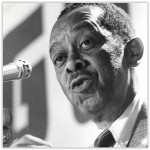(More Information On African Americans)
 Kenneth Clark was born in the Panama Canal Zone to Arthur Bancroft Clark and Miriam Hanson Clark. His father worked as an agent for the United Fruit Company. When he was five, his parents separated and his mother took him and his younger sister Beulah to the U.S. to live in Harlem in New York City. She worked as a seamstress in a sweatshop, where she later organized a union and became a shop steward for the International Ladies Garment Workers Union. Clark moved to New York City during a time in history where the ethnic diversity of Harlem was disappearing, and his school was predominantly Black. Clark was trained to learn a trade, as were most Black students at this time. Miriam wanted more for her son, and transferred him to George Washington High School in Upper Manhattan. Clark graduated from high school in 1931 (Jones & Pettigrew, 2005).
Kenneth Clark was born in the Panama Canal Zone to Arthur Bancroft Clark and Miriam Hanson Clark. His father worked as an agent for the United Fruit Company. When he was five, his parents separated and his mother took him and his younger sister Beulah to the U.S. to live in Harlem in New York City. She worked as a seamstress in a sweatshop, where she later organized a union and became a shop steward for the International Ladies Garment Workers Union. Clark moved to New York City during a time in history where the ethnic diversity of Harlem was disappearing, and his school was predominantly Black. Clark was trained to learn a trade, as were most Black students at this time. Miriam wanted more for her son, and transferred him to George Washington High School in Upper Manhattan. Clark graduated from high school in 1931 (Jones & Pettigrew, 2005).
Clark attended Howard University, a historically black university (HBCU), where he first studied political science with professors including Ralph J. Bunche. During his years at Howard University, he worked under the influence of mentor Francis Cecil Sumner, the first African American to receive a doctorate in psychology. He returned in 1935 for a master’s in psychology.Dr. Clark was a distinguished member of Kappa Alpha Psi fraternity. After earning his master’s degree, Sumner directed Clark to Columbia University to work with another influential mentor, Otto Klineberg (Jones & Pettigrew, 2005).
While studying psychology for his doctorate at Columbia University, Clark did research in support of the study of race relations by Swedish economist Gunnar Myrdal, who wrote An American Dilemma. In 1940, Clark was the first African American to earn a Ph.D. in psychology from Columbia University.
During the summer of 1941, after Clark was already asked to teach a summer session at City College of New York, the Dean of Hampton Institute asked Clark to start a department of psychology there. In 1942 Kenneth Clark became the first African-American tenured full professor at the City College of New York. Clark also started a psychology department at Hampton Institute in 1942 and taught a few courses within the department. In 1966 he was the first African American appointed to the New York State Board of Regents and the first (and only) African American to be president of the American Psychological Association.
Much of Clark’s work came as a response to his involvement in the 1954 Brown v. Board of Education US Supreme Court desegregation decision. After the Brown v. Board of Education case, Clark was still dissatisfied by the lack of progress in school desegregation in New York City. Clark also felt very discouraged by the lack of social welfare organizations to address race and poverty issues. Clark argued that a new approach had to be developed to involve poor Blacks, in order to gain the political and economic power needed to solve their problems. Clark called his new approach “internal colonialism”, with hope that the Kennedy-Johnson administration’s War on Poverty would address problems of increasing social isolation, economic dependence and declining municipal services for many African Americans (Freeman, 2008).
Clark in 1962 was among the founders of Harlem Youth Opportunities Unlimited (HARYOU), an organization devoted to developing educational and job opportunities. With HARYOU, Clark conducted an extensive sociological study of Harlem. He measured IQ scores, crime frequency, age frequency of the population, drop-out rates, church and school locations, quality of housing, family incomes, drugs, STD rates, homicides, and a number of other areas.[2] It recruited educational experts to help to reorganize Harlem schools, create preschool classes, tutor older students after school, and job opportunities for youth who dropped out. The Johnson administration earmarked more than $100 million for the organization. When it was placed under the administration of a pet project of Congressman Adam Clayton Powell, Jr. in 1964, the two men clashed over appointment of a director and its direction.
Clark used HARYOU to press for changes to the educational system to help improve black children’s performance. While he at first supported decentralization of city schools, after a decade of experience, Clark believed that this option had not been able to make an appreciable difference and described the experiment as a “disaster.”
Following race riots in the summer of 1967, U.S. President Lyndon Johnson appointed the National Advisory Commission on Civil Disorders (Kerner Commission). The Commission called Clark among the first experts to testify on urban issues. In 1973, Clark testified in the trial of Ruchell Magee.
Clark retired from City College in 1975, but remained an active advocate for integration throughout his life, serving on the board of the New York Civil Rights Coalition, of which he is now Chairman Emeritus. He opposed separatists and argued for high standards in education, continuing to work for children’s benefit. He consulted to city school systems across the country, and argued that all children should learn to use Standard English in school.
Clark died in Hastings-on-Hudson, New York in May 2005, over twenty years after his beloved partner Mamie.
Click Here For More Information







